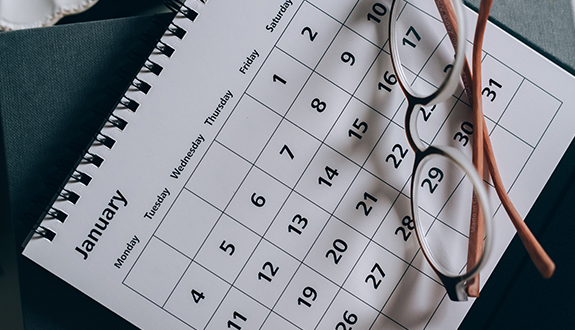There is no “one-size-fits-all” formula to figure out when you should take the MCAT. You can start planning when to start studying for the MCAT and how to study for the MCAT whenever you want, but the general rule of thumb is to prepare for four to six months prior to your exam day.
With that being said, there are a few factors that you can consider before deciding when exactly is right for you.
When Is the Latest You Can Take the MCAT?
The MCAT is a requirement for most medical school applications. The medical school application deadlines range from October to November for MD schools and even as late as March for D.O. schools. The latest MCAT test date MD schools accept is the last September MCAT administered during the year you are applying; given their later application deadlines, DO schools can accept January MCAT dates. While it is completely possible to take your MCAT on the latest possible date and apply very shortly after, this is not an ideal situation.
Many medical schools offer rolling admissions, which means they extend interview invitations and acceptance offers as they receive and review applications. Schools with rolling admissions may accept students before you even submit your application, so it would be in your best interest to get your application in as soon as possible. The early bird gets the worm in the competitive world of medical school admissions.
On the flip side, if you tried submitting your application earlier—say in June—and took your MCAT at the end of the summer, you would still be inadvertently hurting your review process. This is because it is unlikely that the admissions committee will look at your application before your MCAT score comes in. Your medical school application is not complete without an MCAT score.
To get the best chances at completing your application and being among the first to get reviewed by admissions committees, we recommend you take the MCAT in May during the year you are applying or earlier, provided you have enough time to prep for the MCAT and retake the MCAT, if necessary. Think about this when deciding when to start studying for the MCAT.
What Should I Have Prepared Before I Start Studying for the MCAT?
Classes Needed for the MCAT
On an academic level, you will need to make sure you have taken a number of prerequisite courses before diving into preparing for the MCAT. These include physics, chemistry, organic chemistry, biochemistry, biology, psychology, and sociology. These college classes will help you with the topics on the MCAT.
There are also courses that are not required but can be helpful to take before you start studying for the MCAT, as they give you in-depth knowledge about some of the more advanced concepts that are covered on the MCAT exam. These courses include anatomy and physiology, molecular biology, and advanced sociology/psychology courses.
If you cannot fit all these courses into your college schedule before you take the MCAT, don’t worry. You can probably get away with not taking psychology, sociology, and second-semester organic chemistry, but you will have to do a lot more content review than other people who have taken these courses. Definitely try MCAT flashcards to help memorize and review high-yield concepts.
Remember, the MCAT doesn’t just test whether you know the content. It is heavily application-based and requires you to synthesize information. For that reason, studying an entire courseload’s worth of material for numerous science subjects while also trying to build up endurance and test-taking skills would be wildly inefficient. You are better off taking the required courses and getting, at least, familiar with the material before starting your MCAT journey.
Personal
On a personal level, you will ideally have figured out the best ways you learn and have developed self-care practices that keep you grounded and help you de-stress. Figuring out your learning style can be difficult, but taking the prerequisite courses can help you understand how you learn. Doing this before you start preparing for the MCAT can save you hours of time.
Bear in mind that studying for the MCAT is different from studying for a unit exam in college, but understanding what helps you can allow you to make the right decisions about the resources you will use to prepare. Some students thrive in classes and would do best in live MCAT class, while others prefer to prep on their own with a self-paced online MCAT course or with a private MCAT tutor.
P.S. If you’re not sure what your learning style is, our MCAT Advisors can help you discover it! Schedule some time with them for a free call!
Financial
On a financial level, you may have to take additional steps to prepare for some of the resources required to study for the MCAT. Registration for the MCAT costs $325 (or $130 if you qualify for the Financial Assistance Program) and canceling/rescheduling can cost you more if you wait too long to reschedule.
Outside of taking the test itself and using the MCAT prep course of your choice, you should also plan to use the AAMC MCAT Official Prep Products that are written by the test makers of the MCAT. Blueprint might have the best and more realistic MCAT practice tests, but you cannot forget to test your knowledge and strategy with the real deal for ultimate practice.
When Can I Fit MCAT Prep in My Life?
This looks different for everyone. Many college students study for the MCAT over the summer. Others study over the course of a semester that has a lighter course load and little extracurricular involvement. Nontraditional students have studied while working full-time or part-time jobs, ensuring they hit around 20 hours of studying a week.
The path you choose is up to you, but you have to ensure that you have planned well enough that you can follow through with your MCAT study plan without significant hiccups like a family vacation or a time-consuming college course/work project. An MCAT study schedule can help keep you on track and organized, while also showing you where you can be flexible—get your free MCAT schedule here!
When you are studying for the MCAT, it is important that a majority of your time and energy is spent on preparing for the test. Although there are certain things that take priority over the test—i.e. your mental health, academic responsibilities, financial responsibilities, and your family—you will have to sacrifice a lot so you can dedicate yourself to the test.
This means spending less time hanging out with friends, going on vacations, participating in extracurricular activities (even the ones that look amazing on your CV!), and scrolling through TikTok and Instagram on your phone.
The general amount of time that is recommended to spend studying is at least 300-350 hours. The key here is at least—you may need more than this if you are missing some of the prerequisite requirements mentioned earlier. That may seem like a lot, but it comes up sooner than you think. Although it is possible to fit these hours in one or two months, it is not in your best interest to do that if you are struggling in areas like strategy and endurance. As any professional athlete will tell you, it takes time to perfect skills, and the MCAT rewards skilled test takers more than test takers who crammed all the content into their head as fast as they could.
What If Something Goes Wrong?
Contingency planning is important. Now more than ever, we are very aware of the fact that our lives can change dramatically and suddenly. Being prepared for the unexpected with respect to your MCAT study plan can help you prevent your plans from being completely uprooted in situations where your MCAT has to be postponed.
Remember the latest time you can take the MCAT without delaying your application? Don’t make that Plan A. Make that test date Plan B or C. Making sure you have wiggle room when you test can help make sure you take the MCAT when you are actually ready (that is, seeing practice test results that reflect your goal scores).
One of the biggest mistakes people make with the MCAT is seeing practice test scores that are below what they want to see on test day, but testing anyways in the hopes that it will work out. Remembering that the MCAT is a standardized, reliable test will help you remember why that’s a bad idea. Your score won’t change unless you alter your preparation methods, and seeing results from that could take a few weeks or even a few months.
Bear this in mind when you are deciding when to test and, accordingly, when to start preparing for the MCAT. Start by getting a free practice test to see where you are scoring and making a customized study plan.




